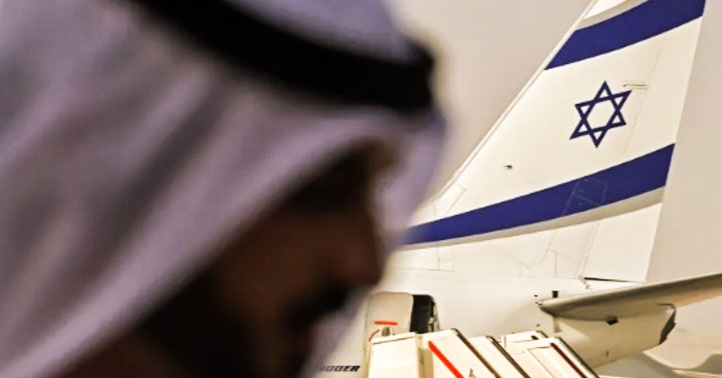AhlulBayt News Agency: In recent years, Arab world has been facing a challenging political phenomenon that has caused new polarizations among the Arab countries. It is the normalization with the Israeli regime. While a majority of the Arab countries are still out of the normalization process, there are some of them that are on the brink of embracing Tel Aviv despite publicly rejecting this idea.
After the numerous signals sent by Saudi Arabia about its tendency for normalization or Qatar’s permission to Israelis to visit the country for World Cup, now Oman has sent similar compromising signals allowing flights to and from the occupied territories.
The news was broken by the Israeli Foreign Minister Eli Cohen last week.
At the same time, Oman’s Civil Aviation Authority announced that the country’s skies were open to all airlines that have requested passage.
The opening of Oman’s airspace to Israeli flights is of great importance to the Israelis. Since Israeli regime has extensive trade relations South and East Asia, and particularly India and China, it has daily flights from Tel Aviv to Asian countries. The Israeli authorities are trying to reduce the travel time and costs by facilitating flights over Arab countries to Asia. Now that Oman, like Saudi Arabia, has allowed Israeli planes to fly in its skies, this dream has come true to a large extent.
The permission followed a trip by a high-ranking Israeli delegation to Muscat in November to persuade the Omani leaders to open their airspace to Israeli flights but returned without an achievement. Some media outlets suggest that the Omani move is motivated by economic privileges offered to Muscat to join the normalization process.
Asbab news outlet held that Oman’s compromises to Israeli regime immediately follow each round of strategic negotiations between Washington and Muscat which revolve around economic cooperation and allow Omani economy into the American financial system and programs.
According to reports, in the same day that Oman announced its decision to allow Israeli planes in its airspace, first round of Washington-Muscat strategic dialogue started.
On the sidelines of this meeting, an MoU was signed between Oman and EXIM, an official export credit agency of the US, to provide financial resources for launching industrial projects, including in various sectors such as wireless communication industries, fifth generation networks, vital technologies, renewable energies, agriculture and wastewater treatment.
Being driven by economic benefits in normalization process is not new to Arab countries and can be the core justification for them to yield to what Arab public see as a “great betrayal” of the Palestinian cause. In early September 2022, Israel Today newspaper reported that the Omani-Israeli trade volume touched $1.4 billion, and as planned under a free trade agreement, their trade would reach $10 billion within five years. Now it seems that the Omani conservative drift to establishing contacts with the Israeli regime is for economic benefit and easing the economic challenges the sultanate is facing. The UAE last year unveiled a plan to connect its ports to Oman’s via a railway, a plan that appears to be part of a broader project to link Israeli and Mediterranean railway network to the Persian Gulf.
In September 2022, during a visit to Muscat of the UAE President Mohammed bin Zayed, an agreement was signed between Oman Rail, the developer and operator of the national railway network in the Oman, and Etihad Rail, the developer and operator of the UAE national railway network, for a joint venture of equal ownership to connect the ports of Khalifa and Jebel Ali in the UAE to Sohar Port and Freezone in Oman with $3 billion investment. Also, another project is making the preparations to connect Oman to the Saudi Arabian railway network.
Meir Masri, a professor of political science at Hebrew University of Jerusalem, maintains that some think that the Israeli-eyed regional coalition revolves around Iranian threats but in fact the most important goal of it is achieving an Israeli-Arab economic closeness.
Amer Sabilah, a political analysts, told the US-based Arabic language news network Alhurra that the region is witnessing “a kind of economic convergence, particularly in the field of transportation, railways and energy”, especially given the crises that the world is currently grappling with.
“Israel has economic and diplomatic relations with Egypt and Jordan and recently expanded them to some Persian Gulf states,” continued Sabilah.
Therefore, it seems that Oman’s final decision on whether to join normalization in the future depends to a large extent on the economic achievements related to the process, and therefore, at present, Muscat leaders are trying to paint measures like opening the airspace to the Israeli planes as uninfluential on miscast general approach to the Palestinian cause and supports to the anti-occupation struggle.
Still, an obvious reality in the today’s world is that economic and political intertwist does not allow for such separations, and the more the economic partnership and normalization-related projects, the greater influence on Oman’s foreign policy approach, something practically distancing Muscat from its usual neutrality policy.
/129
2 March 2023 - 09:28
News ID: 1349877

After the numerous signals sent by Saudi Arabia about its tendency for normalization or Qatar’s permission to Israelis to visit the country for World Cup, now Oman has sent similar compromising signals allowing flights to and from the occupied territories.
